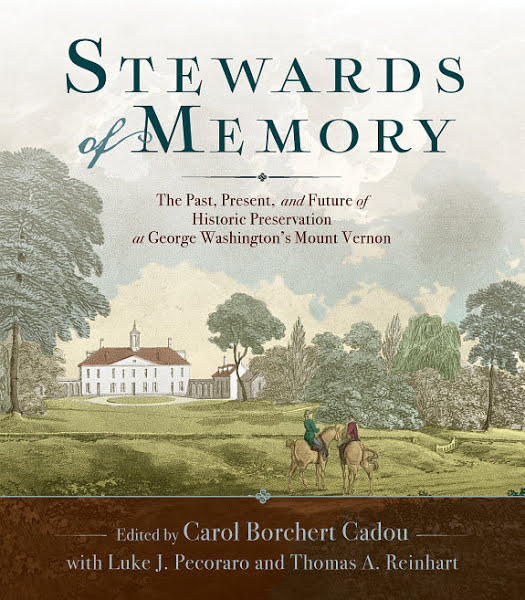The Past, Present, and Future of Historic Preservation at George Washington’s Mount Vernon
Edited by Carol Borchert Cadou
This is an important book on historic preservation that I am very proud to have contributed to with my essay “Stepping Up and Saving Places: Case Studies in Whole Place Preservation”. Focusing on a selection of sites that are doing vital work in preserving not only their historic sites, but the totality of the environmental context, my essay seeks to extract lessons from their campaigns that can benefit us all.
Whole Place Preservation encompasses the historic buildings, landscape, and environs, which is why visionary leadership at the sites that I profile in my essay continually ask, “What kind of future do we want to have?” I addressed this topic in my presentation “Interpreting Historic Landscapes” at the 2017 AASLH fall conference where participants examined the ways that sites across the country approach the interpretation of diverse historic landscapes in order to expand their significance and build engagement among today’s audiences. You can read more about it here.

This image of Mount Vernon with an oil refinery in the background imagines a very real threat that was only averted thanks to dedicated preservationists.
About Stewards of History from the University of Virginia Press:
“Mount Vernon, despite its importance as the estate of George Washington, is subject to the same threats of time as any property and has required considerable resources and organization to endure as a historic site and house. This book provides a window into the broad scope of preservation work undertaken at Mount Vernon over the course of more than 160 years and places this work within the context of America’s regional and national preservation efforts.
“It was at Mount Vernon, beginning with efforts in 1853, that the American tradition of historic preservation truly took hold. As the nation’s oldest historic house museum, Mount Vernon offers a unique opportunity to chronicle preservation challenges and successes over time as well as to forecast those of the future. Stewards of Memory features essays by senior scholars who helped define American historic preservation in the twentieth and early twenty-first centuries, including Carl R. Lounsbury, George W. McDaniel, and Carter L. Hudgins. Their contributions—complemented by those of Scott E. Casper, Lydia Mattice Brandt, and Mount Vernon’s own preservation scholars—offer insights into the changing nature of the field. The multifaceted story told here will be invaluable to students of historic preservation, historic site professionals, specialists in the preservation field, and any reader with an interest in American historic preservation and Mount Vernon.
“Support provided by the David Bruce Smith Book Fund and the Fred W. Smith National Library for the Study of George Washington at Mount Vernon.”
Reviews:
“Stewards of Memory is a uniquely intimate view into how one of the nation’s most important historical sites has maintained itself and continues to ensure its presence, condition, and relevance to the future. Its story is foundational for anyone interested in historical preservation. – Philip Levy, University of South Florida, author of Where the Cherry Tree Grew: The Story of Ferry Farm, George Washington’s Boyhood Home
“A new benchmark in the field of historic preservation, this important volume describes the impressive, state of the art analysis and presentation of Mount Vernon by curators, archaeologists, historians, and preservation professionals.” – Susan Stein, Richard Gilder Senior Curator at Monticello
Carol Borchert Cadou, who spent nineteen years on the collections and preservation staff at Mount Vernon, is Charles F. Montgomery Director and CEO of Winterthur Museum. Luke J. Pecoraro is Assistant Director for Archaeology at George Washington’s Mount Vernon. Thomas A. Reinhart is Director of Architecture at George Washington’s Mount Vernon.
 George W. McDaniel, Ph.D., is President of McDaniel Consulting, LLC, a strategy firm that helps organizations use history to build bridges within itself and to its broader constituents. The company’s tag line, “Building Bridges through History,” is grounded in McDaniel’s personal beliefs and his experience in site management, preservation, education, board development, fundraising, and community outreach. Rather than using history to divide us, he strives to help organizations use history, especially local history, to enhance cross-cultural understanding and to support local museums, preservation, and education. Dr. McDaniel recently led volunteer efforts with Emanuel AME Church and historical organizations in Charleston to use historic preservation to enhance racial reconciliation and healing. McDaniel is also the Executive Director Emeritus of Drayton Hall, a historic site in Charleston, SC, owned by the National Trust for Historic Preservation.
George W. McDaniel, Ph.D., is President of McDaniel Consulting, LLC, a strategy firm that helps organizations use history to build bridges within itself and to its broader constituents. The company’s tag line, “Building Bridges through History,” is grounded in McDaniel’s personal beliefs and his experience in site management, preservation, education, board development, fundraising, and community outreach. Rather than using history to divide us, he strives to help organizations use history, especially local history, to enhance cross-cultural understanding and to support local museums, preservation, and education. Dr. McDaniel recently led volunteer efforts with Emanuel AME Church and historical organizations in Charleston to use historic preservation to enhance racial reconciliation and healing. McDaniel is also the Executive Director Emeritus of Drayton Hall, a historic site in Charleston, SC, owned by the National Trust for Historic Preservation.
A frequent writer, speaker, and facilitator about such issues, he can be reached at gmcdaniel4444@gmail.com or through his website at www.mcdanielconsulting.net.
Header Image: Stewards of Memory. Photo credit: University of Virginia Press


 McDaniel Consulting LLC is a strategy firm that helps organizations use history to build bridges within itself and its broader constituents.
McDaniel Consulting LLC is a strategy firm that helps organizations use history to build bridges within itself and its broader constituents.